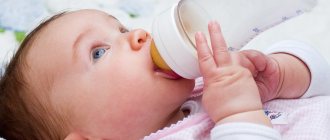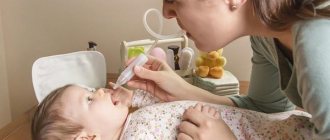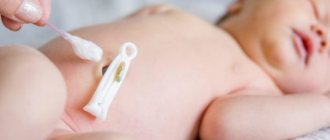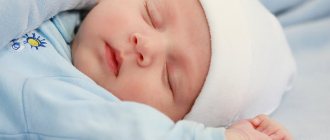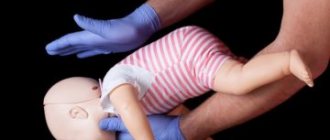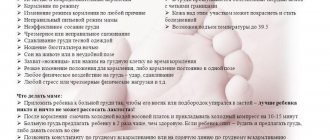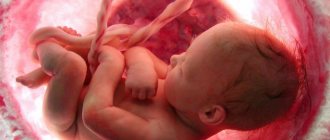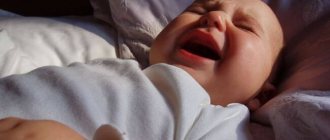Specifics of baby breathing
Every young parent is obliged to monitor the correct breathing of their newborn child. According to physiology, up to one year of age, children can only breathe through their nose. During sleep, the baby's mouth is closed and the tongue is behind the teeth.
If a baby's wheezing is associated with improper breathing, it means he snores. This happens due to improperly formed respiratory cartilages. They block the access of oxygen to the nasal passages. By the age of two, everything falls into place.
To ensure that the baby breathes correctly initially, pediatricians, including Dr. Komarovsky, recommend using a pacifier. While sucking, the baby has no choice; he has to breathe through his nose.
Important! If the child breathes normally and does not require a pacifier, you should not force him, because in the future he will have to be weaned off it.
Doctor Komarovsky about wheezing
The most famous and respected pediatrician throughout the entire former USSR never tires of reminding us of the importance of the right climate in the room. According to him, 90% of problems in infants arise precisely because of improper care.
Too dry and too warm air leads to insufficient heat loss, the child begins to sweat and lose salts so necessary for the body. A similar condition causes in a baby:
- Discomfort: the child is hot, he is capricious.
- Heat rash, skin irritation, diaper rash.
- Problems with sleep: often restless sleep in the first months is associated precisely with air temperature.
- Lung problems, wheezing. Dry air causes the mucous membranes to dry out, in this state they are more susceptible to injury and infection.
- The wrong climate can lead to allergies, anxiety, wheezing and even blood clots.
From all of the above, only one conclusion can be drawn: when wheezing appears, pay attention to the baby’s condition. It may be worth reconsidering the temperature and humidity indicators in the room. If the baby’s condition causes you concern, consult a doctor immediately, remember that all processes in a child’s body proceed faster.
Causes of nasal wheezing in newborns
At what age can a child be given beets?
Wheezing in a newborn's sleep occurs for various reasons. Sometimes it is a physiological process or the air is too dry. Below are all the possible causes of nasal wheezing.
Physiological characteristics of the body
Before birth, the baby was accustomed to being in an aquatic environment, where his body received a sufficient amount of moisture. When he is born, the environment changes from water to air. The baby's skin and mucous membranes begin to dry out. For the first 2-3 months, you should thoroughly moisturize the baby’s skin and nasal mucosa with special products.
A saline solution is used for the nose. It increases glandular secretion and mucus production. If you neglect to care for the nose, its membranes dry out, and the newborn wheezes when breathing.
Newborn crying
Dry indoor air
The optimal air humidity value for an adult is 60-70%. For newborns, this figure should be 10-20% higher. The indicator must be at least 80%. This promotes restful sleep and prevents the skin and mucous membranes from drying out.
If the air in the room is dry, the newborn will expel some of its fluid through the nose when breathing. As a result, the nasopharynx dries out. Crusts form on the surface, the baby wheezes.
You can determine the humidity level in a room using a hygrometer. It is installed indoors and shows the value. Usually the device is electronic. There are also mechanical ones, they are much cheaper than electronic ones. They are placed in a room and the air humidity and temperature are determined using a special grid pattern.
Interesting. A clue to low humidity will be indoor plants. The soil in the pot becomes dry, which means it’s time to humidify the room.
Currently, various air humidifiers for children's rooms are produced. Dr. Komarovsky recommends purchasing such a device for your baby. If it is not possible to buy one, then hang wet diapers in the room.
Important! A special device will help you track the humidity level in the room.
Unclean spout
If an infant wheezes, this may be due to uncleaned nasal passages. Pediatricians recommend performing the procedure daily after waking up. Healthy breathing contributes to a good supply of oxygen to the brain and heart.
A saline solution is injected into the nose and the nose is cleaned using a gauze turunda. Hold the head with one hand, and roll the turunda with the other. Children do not like this process, but it significantly improves breathing.
Suitable solutions for cleaning the spout:
- saline;
- AquaMaris;
- Rinolux;
- Aqualor;
- Salin;
- Aquamaster;
- Morenizal.
Sea water is used for their production. The salt concentration is adjusted to a certain level. It makes no difference which bottle you buy, the principle of operation is the same for all.
Baby's nose is washed out
Dust accumulation
After the arrival of a newborn in the apartment, it is recommended to carry out daily wet cleaning. Dust particles are constantly suspended in the air. If you neglect cleaning, they will begin to accumulate and settle on objects. When the window is opened, dust will again enter the air.
After a person inhales air containing a suspension of dust, it begins to settle on the walls of the nasal passages. Clumps of dirt form clumps and clog passages. When breathing, the baby begins to wheeze.
It is difficult for a mother to constantly monitor her newborn and the perfect cleanliness of the house. It is recommended to use the help of relatives. Cleaning can be temporarily delegated to dad. The baby needs clean and moist air.
Contaminated air
The air in the room where the child is located should be as clean as possible. Polluted oxygen and the admixture of chemicals have a detrimental effect not only on the entire respiratory system, but also on other organs.
How do contaminated particles get into a room? The answer is simple - for example, renovation using paint in the next room, tobacco smoke, combustion products, the smell of acetone.
If chemicals get into the air, it can cause not only wheezing in the nose, but also poisoning the baby. Frequent contact with chemicals affects the nervous system.
Important! During the renovation, the newborn is isolated in another building.
Lack of physical activity
Sometimes a newborn wheezes in his sleep because he is not moving enough. Every mother should know that exercise, massage and lying on the tummy help disperse blood throughout the body.
If the baby constantly lies down, then the flow of blood and oxygen to the lungs and respiratory system will not be enough. This will cause the mucous membrane to dry out. All pediatricians and Dr. Komarovsky talk about this.
Newborns, just like adults, want to stretch their legs. Constantly staying in one position contributes to blood stagnation. Massage and exercise do not take much time. They are carried out either in the morning after waking up, or after bathing before bed.
They lay the baby on his tummy so that he learns to hold his head up, and stretch his arms and legs. Massage the tummy with smooth movements. This will relieve not only wheezing, but also other problems in the child. If it is difficult to exercise every day, then do exercises at least several times a week.
Baby and massage
Causes of wheezing in the throat in infants
Redness, inflammation of the foreskin in a child under one year old
Sometimes when a baby breathes, he wheezes not because of the nose, but because of the throat. The cause can be physiological or pathological. In any case, you should contact your pediatrician to find peace.
Inability to swallow saliva
Babies begin to swallow saliva only at 6 months of age. At this time, they begin to try adult food, nibble on cookies and snacks. Until this moment, they do not control salivation.
If the child also refuses the pacifier, then saliva drips onto his clothes and other objects. We'll have to constantly change his clothes. Saliva accumulates in the mouth area, and the baby's throat wheezes. This is a physiological process that takes place on its own.
Salivation during teething
From 3-5 months, newborns begin to erupt teeth. If they are invisible, this does not mean that they are not cutting. This process causes a lot of discomfort. Babies begin to salivate profusely.
Children do not know how to swallow saliva in infancy. That's why they often wheeze and choke on it. In this case, you don’t need to do anything; everything will return to normal with the appearance of the first tooth. Many children have a hard time with tooth decay, sometimes they develop a fever and a runny nose, and the kids behave restlessly.
Important! Special homeopathic remedies will help alleviate the condition.
Baby's saliva
Regurgitation of food
Regurgitation of breast milk occurs in 90% of infants. This is a physiological process and does not require treatment. If regurgitation is profuse, then special milk formulas are prescribed.
The normal amount of regurgitated mass is 2 tbsp. If there is more spitting up, then it is considered vomiting. Check the quantity using a diaper and water. 2 tablespoons are poured onto it. water and compare the spots. If they are practically the same, then there is nothing to worry about.
The baby may burp in the middle of the night, so he is put to sleep on his side. Some of the breast milk remains in the mouth and slightly blocks the throat, causing the baby to wheeze.
After night feeding, the baby should be carried in a column so that he burps everything into the diaper before going to bed. Then the amount of wheezing will be significantly reduced or disappear completely.
Vocal cord overstrain
If a child often cries and behaves restlessly, his vocal cords are overstrained. You need to monitor the baby, try not to let him cry, find the cause of his irritated behavior and eliminate it.
When the vocal cords shrink, the baby may become hoarse. This is not very good - in the future it may affect the formation of a hoarse voice. Just in case, it is recommended to consult a doctor. It will help you find the cause of frequent anxiety. This may be an inappropriate mixture, frequent colic, or high room temperature.
Important! The child will quickly recover the damaged ligaments when he begins to cry and scream less.
The baby is screaming
When to see a doctor
If you suspect that wheezing when breathing in a newborn is associated with an illness, you should consult a doctor. Most often, this condition is accompanied by a number of symptoms. It is important to pay attention to all manifestations in time, to see how the child feels.
ARVI disease
Corn porridge with milk for a child - how to cook
With colds, the child grunts in his sleep. There is copious mucus discharge. It gets into the lungs and respiratory tract, interferes with normal breathing, and the nose begins to whistle. There are wheezing in the throat and lungs. ARVI is accompanied by a number of symptoms:
- cough;
- restless sleep;
- elevated temperature;
- decreased appetite;
- anxiety.
The viral infection spreads quickly, so do not delay visiting the doctor. If a cold is suspected, a doctor is called to your home on the same day. Failure to treat it can lead to complications. Serious illnesses develop:
- infection of internal organs;
- pneumonia;
- obstructive bronchitis.
During a cold, the doctor tries to cure the child using physiotherapy. In severe cases, prescribes antibiotics.
Pathologies
Wheezing in newborns occurs due to congenital and acquired pathologies. In such cases, grunting is regarded as a symptom. Pathological processes include:
- underdeveloped respiratory system;
- lobar pneumonia;
- bronchial asthma;
- acute bronchitis;
- emphysema;
- neoplasm;
- allergic rhinitis;
- Quincke's edema;
- irregular nasal septum;
- tracheal occlusion;
- narrowing of the bronchi during breathing.
Some of the above conditions are accompanied by elevated temperature. Doctors diagnose congenital pathologies in the first three months of life. If you suspect an illness, you should consult a doctor immediately. Newborns have a weak immune system that cannot fight off infection on its own.
Important! Self-medication can aggravate the situation; any medications should be prescribed by a doctor.
Doctor listening to baby
Other reasons
In infants with congenital heart defects, wheezing in the chest is common. This is one of the leading symptoms. The disease is most often diagnosed in the maternity hospital and during regular pediatric examinations.
If the heart defect is not very serious, then treatment will not be required. Some children undergo heart surgery. The decision is made by a pediatric cardiologist after a thorough examination of the baby. If possible, surgical treatment is postponed to an older age.
When a newborn wheezes in his sleep, it causes a lot of worry. Parents worry about the baby’s health and his future. Most often, the reason lies in the living conditions of the baby. It is worth consulting a doctor, he will tell you the exact cause of this symptom. The baby wheezes when he breathes more often for physiological reasons.
Treatment options
It must be said right away that treatment for children is prescribed by a doctor. Self-medication is unacceptable!
- If wheezing is caused by a runny nose, the pediatrician prescribes drops, sprays and rinses. Usually such remedies are effective and quickly cope with the disease. For allergic rhinitis, antihistamines are prescribed.
- Treatment of adenoids and nasal polyps can be conservative or surgical. Conservative tactics are chosen when there are a small number of adenoids. The operation is performed when there is pronounced proliferation of the nasopharyngeal mucosa.
- Treatment of bronchitis and pneumonia can be carried out both in outpatient and inpatient settings: it all depends on the severity of the disease and the age of the child.
- Foreign bodies from the respiratory tract can only be removed by a doctor. Doing it on your own can make the problem worse. The object may sink further into the lungs or become lodged in the nasal passages.
- In conditions that threaten the baby’s life, emergency therapy is carried out aimed at restoring basic vital functions (breathing, heartbeat).
- If wheezing is caused by reasons unrelated to illness, you can help your child cope with the problem at home.
